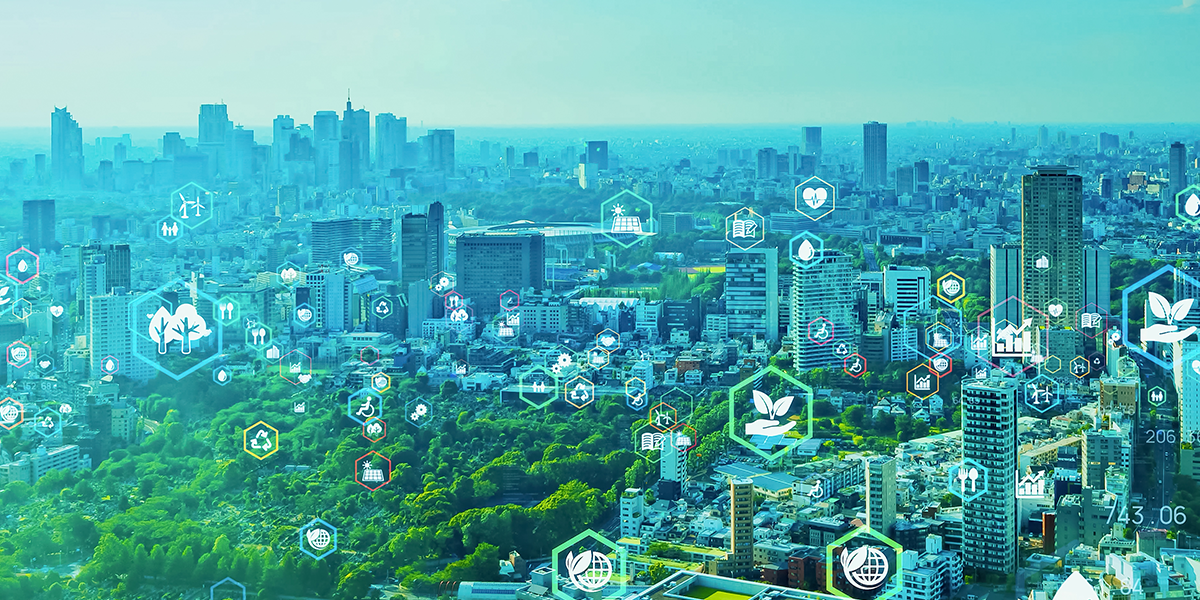Smart cities are defined as cities that aim to improve factors such as sustainability, efficiency, and livability by using technological infrastructure and information management systems. Smart cities optimize various city services using information and communication technologies and aim to improve the quality of life of residents by using resources efficiently.
Smart city applications include various sensors, data collection systems, network connections, and analysis tools. For example, the ability to offer technological solutions in areas such as traffic management, energy efficiency, environmental protection, security, transportation, healthcare, and water management increases the attractiveness of smart cities.
What is Smart Urbanism?
Smart urbanism refers to the use of information and communication technologies (ICT) in the planning, management, and development of cities. Smart urbanism supports development and efficiency in areas such as sustainability, livability, and the welfare of residents.
Smart urbanism consists of various components. These include digitalization of infrastructure and services, smart transportation systems, energy management, environmental sustainability, smart buildings and housing, resource efficiency, e-government services, education and healthcare, security systems, data analytics, artificial intelligence, and IoT (Internet of Things).
The Future of Smart Cities: Sustainability and Innovation
Sustainability is among the main goals of smart cities. It is seen as a necessity to focus on priority work in areas such as energy efficiency, carbon footprint reduction, waste management, water saving, and environmental protection. Smart cities adopt the most innovative approaches in sustainability areas such as energy management systems, renewable energy sources, smart buildings, smart transportation systems, and waste management.
Innovation plays a major role in the future of smart cities. The development and implementation of new technologies make cities more efficient, safe, and user-oriented. Smart cities are expected to become more efficient as advanced technologies such as the Internet of Things (IoT), artificial intelligence (AI), big data analytics, cloud computing, and autonomous systems expand their use.
Smart City Technologies: How Do They Make People's Lives Easier? Which Problems Does It Solve?
Applications that can be generalized as smart city applications are defined as steps that contribute to the functioning of cities, make life easier, and solve problems.
1) Intelligent Transportation Systems: How Can We Reduce Traffic? Intelligent transportation systems reduce traffic congestion, make transportation more efficient and shorten travel times.
2) Better Energy Management in Cities: Smart cities use energy management systems that monitor energy consumption, increase energy efficiency and reduce energy costs. Thanks to smart meters and smart networks, energy consumption can be monitored in real-time and citizens can be informed to save energy.
3) Safer Cities: Security systems in smart cities are supported by cameras, sensors, and analytical tools. These systems help reduce crime rates and enable rapid response.
4) Easier Access to Services: In smart cities, citizens can access public services more easily and quickly through e-government services and digital platforms.
5) Environment and Sustainability: Environmental protection and sustainability are considered an important focus in smart cities. Smart waste management systems reduce the amount of waste and facilitate recycling.
Advantages and Disadvantages of Smart Cities
We can summarize the advantages of smart cities as follows.
1) Efficiency and Sustainability: Smart city technologies increase efficiency and support sustainability in areas such as energy management, transportation planning, and waste management. In this way, resources are used more efficiently and environmental impact is reduced.
2) Service Quality and Improved Life: Smart cities support fast and effective service delivery. Thanks to advanced technologies and data analytics, city dwellers are provided with better healthcare, security, education, and transportation services which improves the quality of life.
Smart cities also have some disadvantages.
1) Privacy and Data Security Risks: Smart cities collect and analyze large amounts of data. This can bring privacy and data security risks. Getting data into the hands of malicious people or unauthorized access can lead to security problems.
2) High Cost: Smart cities can be costly to install and maintain. This is because factors such as infrastructure investments, installation of sensors, software, and hardware updates increase costs. This limits some cities' access to these technologies.










Hello!
As writers for theBClog, we share with you articles that highlight current developments and inspiring ideas in various topics, from sustainability to technology, energy to climate, and innovation to human interest stories.
Enjoy!